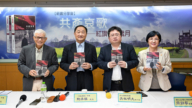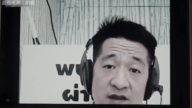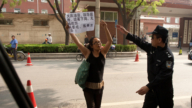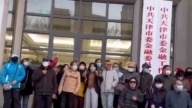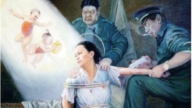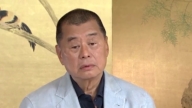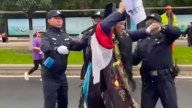【新唐人2014年01月17日讯】日前,纪念“萨哈罗夫思想自由奖”25周年的活动在美国国会举行。在会议上,这一奖项的几位获得者以及多位美国议员,就人权和思想问题发言。曾经获得这一奖项的大陆维权人士胡佳,呼吁国际社会更多的关注中国人权问题。
由欧洲议会驻美办事处、以及美国国会“兰托斯人权委员会”,联合主办的“萨哈罗夫思想自由奖”25周年活动,1月14号在美国国会举行。活动由“自由之家”副执行主任丹尼尔-凯领尔特(Daniel Calingaert)主持。由“魏京生基金会”、“自由之家”、“记者无国界”,以及“古巴民主倡导者”等组织协助举办。
“萨哈罗夫思想自由奖”是欧洲议会在1988年12月设立。以苏联著名异见人士,诺贝尔和平奖得主安德烈-萨哈罗夫的名字命名。为表扬那些为捍卫人权以及思想自由而做出贡献的个人和组织。
自“萨哈罗夫思想自由奖”设立的25年以来,世界不同国家的人权和思想自由活动人士,先后被授予这个奖。,欧洲议会将2013年“萨哈罗夫思想自由奖”,颁给了因为争取妇女教育权,而遭塔利班极端主义分子袭击的16岁巴基斯坦少女——马拉拉•优素福扎伊(Malala Yousafzai)。
在此之前,中国也有两名异见人士被授予这一奖项。一名是曾被中共当局监禁先后共18年的异议人士魏京生,他是1996年在狱中服刑的时候,获得了这一奖项。
魏京生在接受《美国之音》采访时,透露了当年知道被授予这一奖项时的心情。
中国异见人士魏京生:“(当时)当然非常高兴,这就说明其实全世界都已经关注中国,而且注意到咱们中国人为了民主、自由的努力。”
另一名获得“萨哈罗夫奖”的是北京维权人士胡佳。
北京维权人士胡佳:“我是第20届,2008年的获得者。特别感谢当我在作为奥运囚徒,在监狱里时,就是欧洲议会把萨哈罗夫奖颁发给我,那个奖项大大改善了我在监狱里的待遇,然后也给很大的鼓舞和信心。”
中国社会活动家胡佳,多年来关注大陆社会运动,包括环保事业、抗击爱滋病和争取民主人权等。曾多次遭到当局的软禁、拘捕。2008年,胡佳被当局以“煽动颠覆国家政权罪”的名义判刑3年零6个月。
胡佳:“14号在美国国会举行的活动,我也听到了、看到了这样的消息,满振奋的,因为美国和欧洲是全球最著名的国家,对于中国的人权问题来讲,继续需要靠中欧和中美就中国的人权问题发出统一的声音、采取统一的行动,比如说,要求停止迫害法轮功啊、停止迫害六四的这些(人)。”
胡佳表示,在中国,还有很多为了民主、自由深陷牢笼的人,这些人都是需要国际社会的关注。
胡佳:“我上次获奖是2008年,到现在正是中国的网路改变中国的时机,然后许多公民的城市化、街头化行动受到政府的维稳管制,强行打压,真的是特别期待。萨哈罗夫奖或者说欧洲议会能再次把视线聚焦在这块土地上,为争取自由而奋斗的像许志永律师、高智晟律师、郭飞雄先生这些人的身上,因为我们中国需要这样的给予和保障。”
胡佳表示,获得了“萨哈罗夫奖”之后,也给他带来压力,因为它激励着自己在有生之年,必须为被中共控制的这个专制国家,做更多更多的事情,这样才能够对得起“萨哈罗夫奖”。
采访/朱智善 编辑/田净 后制/孙宁
Sakharov Prize: Chinese Winners, 25 years of Promoting Human Rights
The 25th anniversary of the Sakharov Prize for Freedom
of Thought was celebrated in Washington D.C. on Tuesday.
Joined by U.S. lawmakers and a Sakharov Laureate,
statements on human rights issues were issued.
Back in China, Chinese activist Hu Jia, the 2008 winner,
calls on the international community to pay more attention
to China’s human rights issues.
The 25th anniversary of the Sakharov Prize, jointly organized
by European Parliament Liaison Office and the Tom Lantos
Human Rights Commission, was held on Jan. 14
at the U.S. Congress in Washington.
Freedom House Executive Vice President Daniel Calingaert
moderated the meeting, which was sponsored
by Wei Jingsheng Foundation, Freedom House, Reporters
Without Borders, and Cuba Advocates for Democracy.
The Sakharov Prize for Freedom of Thought, named after
Soviet scientist and dissident Andrei Sakharov,
was established in December 1988
by the European Parliament.
The Prize honors individuals or organizations for their efforts
on behalf of human rights and fundamental freedoms.
For 25 years, the Sakharov Prize has awarded human rights
defenders of the world.
16-year-old Pakistani Malala Yousafzai has been awarded
the 2013 Sakharov Prize for Freedom of Thought
for her fight to promote education for girls
in the face of Taliban violence.
In China, two dissidents have been previously awarded
this prize.
One is Wei Jingsheng who had been imprisoned
for 18 years by the Communist regime.
He won in 1996 at a time when he was incarcerated.
In an interview with Voice of America, Wei Jingsheng
revealed his thoughts at the time he was honored the prize.
Wei Jingsheng, Chinese dissident: “(I was) of course
very pleased.
That means the world has noticed the efforts of the Chinese
involved in democracy and freedom in China."
The second Chinese winner is Beijing activist Hu Jia.
Hu Jia, Beijing activist: “I was the 2008 winner.
I was detained during the Beijing Olympics.
The European Parliament awarding me with the Sakharov
Prize helped to greatly improve my situation in prison.
It was also very encouraging and brought
great confidence to me."
Chinese activist Hu Jia has participated in numerous social
movements in China such as environmental protection,
the fight against AIDS and the fight for democracy
and human rights.
Authorities have repeatedly arrested him and put him
under house arrest.
In 2008, Hu Jia was convicted of inciting subversion
and served a three-and-a-half-year jail sentence.
Hu Jia: “I heard about the meeting on the 14th in the U.S.
Congress. It is exciting.
When it comes to China’s human rights issues the unified
voice and action of the world’s famous countries such as
the United States and those in Europe are continuously
relied on to stop the persecution of Falun Gong
and of participants of the Tiananmen students movement."
Hu Jia indicates that there are many imprisoned democracy
and freedom activists in China in need of the international
community’s help.
Hu Jia: “I was awarded in 2008.
Now China is facing changes in the Internet era.
I really have high hopes – with the urbanization there are
many citizen’s movements being suppressed in the streets
in the name of stability maintenance.
China needs the Sakharov Prize and the European Parliament
to once again pay attention to Chinese rights defenders
such as attorneys Xu Zhiyong, Gao Zhisheng, Guo Feixiong
and others."
Hu Jia expresses that the Sakharov Prize has motivated
and encouraged him to work harder and do more under
the authoritarian Communist regime to be worthy
of the honors bestowed upon him by the Sakharov Prize.
Interview/ZhuZhishan Edit/TianJing Post-Production/SunNing




